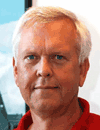Co-Located Conference AgendasBiodetection & Biosensors | Lab-on-a-Chip & Microfluidics | Microarray Technology | Point of Care Diagnostics | 

Tuesday, 17 March 201508:00 | Registration | |
Protein Arrays in Clinical Practice |
| | |
Session Chair: Christer Wingren, Lund University |
| | 09:00 |  | Keynote Presentation Application of Chromosome Microarray in a Clinical Setting and Implications for Patient Management
Denise Batista, Associate Professor, Johns Hopkins University School Of Medicine, United States of America
In the clinical laboratory the use of chromosome microarray resulted in significant increase in the number of patients with a genetic diagnosis, as well as expanded the phenotypic spectrum in a variety of syndromes. It also showed that in some cases, the same genomic change can be present in patients and in controls thus implying a contribution from the genomic background and maybe environment. Clinical diagnoses achieved after microarray have direct influence on patient management.
|
| 10:00 | Coffee and Networking in Exhibition Hall | 10:45 | Reverse Phase Protein Arrays as a Tool to Identify New Biomarkers and Potential Therapeutic Targets for Breast Cancer Subtypes
Leanne De-Koning, Manager, Institut Curie, France
Reverse Phase Protein Arrays are a powerful tool to study protein expression and activation status in hundreds of samples. We applied this technology to study lobular and triple negative breast cancers with the aim to identify new prognostic biomarkers and therapeutic targets. | 11:30 | Reverse Phase Protein Array (RPPA) Applications in Translational Oncology
Ulrike Korf, Senior Scientist/Group Leader, German Cancer Research Center, Germany
New innovative, accurate, reliable and cost-effective tools are required to improve patient stratification and to bridge the gap between in vitro diagnostics and clinical decision-making. This challenge was addressed from a proteomic point-of-view, and recent data obtained by using reverse phase protein arrays (RPPA) to advance personalized medicine will be presented and discussed.
| 12:15 | Lunch & Networking in Exhibition Hall | |
13:30 Poster Viewing | Session Sponsors |
| | |
Session Chair: Miroslav Blumenberg, NYU Langone Medican Centre |
| | 14:15 | Functional Protein Profiling in Tissue Samples for Next Generation Molecular Diagnostics
Karl-Friedrich Becker, Head, Technical University of Munich, Germany
For functional protein profiling in clinical tissue samples it is necessary to implement tools that allow fast, precise, cheap, and simultaneous analysis of many network components while requiring only a small amount of clinical material. Reverse phase protein array (RPPA) is a promising technology that meets these requirements while enabling quantitative measurement of proteins and phosphoproteins. | 15:00 | Multi-platform Microarray Analysis for Interrogating FAK Function in Cancer
Bryan Serrels, Postdoctoral Research Scientist, University of Edinburgh, United Kingdom
We have recently identified a new and exciting role for FAK in orchestrating the composition and activation status of the tumour promoting microenvironment. Our strategy to delineate the function of nuclear FAK in cancer combines multiple microarray-based approaches, including gene expression arrays, RPPA, and antibody capture arrays. This will form the focus of my talk. | 15:45 | Coffee and Networking in Exhibition Hall | 16:30 | Molecular Profiling of Autoimmune Disease for Improved Diagnosis, Prognosis, and Classification
Christer Wingren, Associate Professor And Lecturer, Lund University, Sweden
We have shown that affinity proteomics can be used to profile crude, non-fractionated serum and urine proteomes, extracting molecular portraits of SLE and other autoimmune conditions, paving the way for improved (differential) diagnosis, prognosis, and classification based on a blood (urine) test, as well as for an enhanced understanding of the disease biology.
| 17:15 |  | Keynote Presentation Biomarkers of Clinical Relevance - How and What?
Carl Borrebaeck, Professor and Deputy Vice Chancellor, Lund University, Sweden
There is an abundance of biomarkers, although very few actually have clinical utility. Since the consensus today is that single biomarkers do not contain enough information to have any clinical relevance, we have developed a multiplexed approach resulting in accurate diagnosis of complex diseases, including cancer and autoimmunity.
|
| 18:15 | Drinks Reception |
Wednesday, 18 March 2015 |
Nucleic Acid Arrays |
| | |
Session Chair: Denise Batista, Johns Hopkins University School of Medicine |
| | 09:00 | | 10:00 | Coffee and Networking in Exhibition Hall | |
Emerging Technologies |
| | 10:45 | Skinomics: Microarrays in Dermatology and Skin Biology
Miroslav Blumenberg, Associate Professor, NYU Langone Medical Center, United States of America
Due to accessibility skin and dermatology were among the earliest objects for microarray studies. Noninvasive skin sampling targeted melanomas; additionally, carcinomas, psoriasis, wound-healing, etc. have been analyzed. Recently, using microarrays identified genes specific for epidermal stem cells and those changing during keratinization. | 11:30 | Isothermal Parallel Amplification of microRNAs and Microarray-based Detection
Thomas Brandstetter, Group Leader, University Freiburg, Germany
miRNAs are in the focus for biomarker validation. We present here a biochip platform for isothermal, multi-parametric miRNA amplification combined with microarray-based detection. | 12:15 | Lunch & Networking in Exhibition Hall | |
13:30 Poster Viewing | Session Sponsors |
| | |
Session Chair: Rastislav Levicky, NYU Polytechnic School of Engineering |
| | 14:00 | Polymer Microarrays - Discovering Polymers to Control Stem Cells
Annamaria Lilienkampf, Research and Teaching Fellow, Edinburgh University , United Kingdom
The Bradley group has developed polymer microrarrays where up to 7000 different polymer features can be inkjet synthesized on a glass slide. These thousands of substrates can be screened with stem cells in a high-throughput manner to allow the discovery of novel substrates that control and modulate stem cells. The identified polymers are rapidly scaled-up. Using this approach polymers have been identified that:
(i). Bind adipose derived stem cells, controlling their differentiaiton while enabling thermal harvesting; (ii). Control and stabilize hESC derived hepatocytes with enhanced P450 functionality; and (iii). Promote bone formation from Stro+ cells.
| 14:45 | From Microarrays to Nanoarrays: Measuring Hybridisation on Single Molecule Probes
Jens Sobek, Research Scientist, University of Zurich, Switzerland
Applying a new technology, we are trying to find new ways in order to overcome some of the limitations intrinsic to microarraying. We are studying the kinetics of molecular interactions of a single probe molecule immobilised on a chip surface. The chip consists of 160000 nanostructures with a diameter of about 100 nm. We are aiming for reducing microarray spots with respect to the number of immobilised molecules from about 10^12 to 1, and performing experiments with a single molecule per nanostructure. | 15:30 | Coffee and Networking in Exhibition Hall | 16:00 | Carbohydrate Arrays and Glyconanoparticles: Immunity, Infection and Bioterrorism
Rob Field, Project Leader, John Innes Centre, United Kingdom
| 16:45 | Close of Conference |
|


 Add to Calendar ▼2015-03-17 00:00:002015-03-18 00:00:00Europe/LondonMicroarray TechnologyMicroarray Technology in Berlin, GermanyBerlin, GermanySELECTBIOenquiries@selectbiosciences.com
Add to Calendar ▼2015-03-17 00:00:002015-03-18 00:00:00Europe/LondonMicroarray TechnologyMicroarray Technology in Berlin, GermanyBerlin, GermanySELECTBIOenquiries@selectbiosciences.com